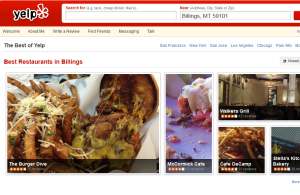Travel Channel Host: Yelp Is A Forum For Uninformed Morons To Take Down Restaurants

Zimmern calls Yelp a “forum for a bunch of uninformed morons.”
Andrew Zimmern, host of Travel Channel’s Bizarre Foods, recently voiced his displeasure with online review site Yelp in his “Go Fork Yourself” podcast.
“The problem for me is that crowd sourcing is very beneficial except when it comes to things like restaurant criticism and restaurant reviews and restaurant recommenders,” explains Zimmern [via Eater.com], who likens asking Yelp for a restaurant suggestion to asking his son “which John Updike book is his favorite — because he’ll just point at any old random one. And while he might get lucky, and certainly most John Updike books are really good, Yelp essentially gives a tremendous forum for a bunch of uninformed morons to take down restaurants.”
Zimmern cites the story of the owners of New York’s Big Gay Ice Cream shop, who recently claimed they were contacted by a group of “elite” Yelp reviewers who demanded the shop open early just for them.
The TV host, who had previously penned an editorial saying that Yelp wasn’t as bad as it had been — thanks to management and filtering of reviews, says he’s reverting back to his old way of thinking about the site.
“I have now decided after another six eight months have gone by that the number of stories that I hear like this from people who I trust, who I know aren’t BSing me… that Yelp has become dangerously unstable. Because clearly they have people abusing the system, who are using the Yelp name to go out and graymail and blackmail restaurants. Yelp to me is something that just doesn’t work.”
I’ve previously put in my two cents about how users should read all Yelp reviews — not just for restaurants — with a grain of salt, but I feel like there are two issues that make crowd-sourced restaurant reviews particularly difficult.
First, what constitutes good and bad food is often a subjective matter (as evidenced by the hate mail I still receive for this 2010 headline), and just because a restaurant’s menu may only cater to a smaller group of customers does not necessarily mean it’s not providing a good product.
Second, as we’ve mentioned many, many times on this site it’s often easier to get someone to say something mean online than it is to get them to offer praise, so a number of restaurant operators, whether they are right or not, are going to get defensive when they see a negative review online — and some of them will fire back in ways that are probably out of proportion to the original review.
Eating out is a risk. And for centuries, it was a risk we all took — and (mostly) survived — without the assistance of the Internet.
Want more consumer news? Visit our parent organization, Consumer Reports, for the latest on scams, recalls, and other consumer issues.

